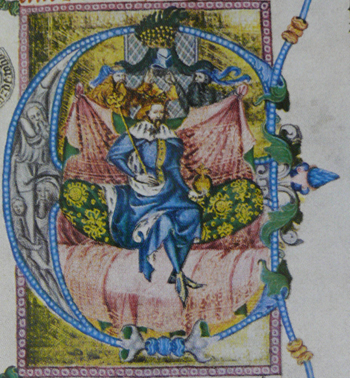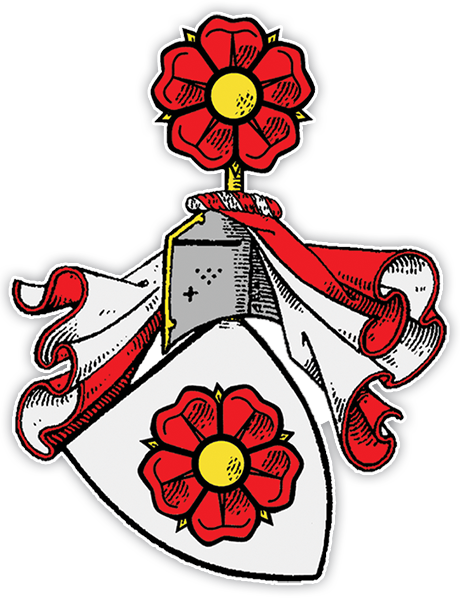|
Lipolt Krajíř Of Krajek
Lipolt Krajíř of Krajek (died 1433) was a Bohemian military leader. In April 1420, he was appointed military governor of České Budějovice by Sigismund of Luxembourg. He played a prominent role in the Hussite Wars against the Taborites, and was known for his conflicts with Oldrich II of Rosenberg. Lipolt was born to Konrád II of Krajek and had two brothers; Konrád III and Jan I. His family held estates in Lower Austria, Styria, Carinthia, Moravia, and Bohemia. He is mentioned 1381 as part of the retinue of King Wenceslas IV Wenceslaus IV (also ''Wenceslas''; cs, Václav; german: Wenzel, nicknamed "the Idle"; 26 February 136116 August 1419), also known as Wenceslaus of Luxembourg, was King of Bohemia from 1378 until his death and King of Germany from 1376 until he w ... during a diplomatic trip to England. Lipolt became one of the premier leaders in the Hussite Wars. Albert II of Germany trusted his experience, and he was granted the highest position of military leader ... [...More Info...] [...Related Items...] OR: [Wikipedia] [Google] [Baidu] |
České Budějovice
České Budějovice (; german: Budweis ) is a city in the South Bohemian Region of the Czech Republic. It has about 93,000 inhabitants. It is located in the valley of the Vltava River, at its confluence with the Malše. České Budějovice is the largest city in the region and its political and commercial capital, the seat of the Roman Catholic Diocese of České Budějovice, of the University of South Bohemia, and of the Academy of Sciences. It is famous for the Budweiser Budvar Brewery. The historic city centre is well preserved and is protected by law as an urban monument reservation. Administrative parts České Budějovice is made up of seven city parts named České Budějovice 1–7. České Budějovice 5 forms an exclave of the municipal territory. Etymology The name Budějovice is derived from personal Slavic name ''Budivoj'', meaning "the village of the people of Budivoj". The name first appeared as ''Budoywicz'', then it appeared in various similar forms. The Germa ... [...More Info...] [...Related Items...] OR: [Wikipedia] [Google] [Baidu] |
Sigismund Of Luxembourg
Sigismund of Luxembourg (15 February 1368 – 9 December 1437) was a monarch as King of Hungary and Croatia (''jure uxoris'') from 1387, King of Germany from 1410, King of Bohemia from 1419, and Holy Roman Emperor from 1433 until his death in 1437, as well as prince-elector of Brandenburg (1378–1388 and 1411–1415). He was the last male member of the House of Luxembourg. Sigismund was the son of Holy Roman Emperor Charles IV and his fourth wife Elizabeth of Pomerania. He married Queen Mary of Hungary in 1385 and was crowned King of Hungary soon after. He fought to restore and maintain authority to the throne. Mary died in 1395, leaving Sigismund the sole ruler of Hungary. In 1396, Sigismund led the Crusade of Nicopolis, but was decisively defeated by the Ottoman Empire. Afterwards, he founded the Order of the Dragon to fight the Turks and secured the thrones of Croatia, Germany and Bohemia. Sigismund was one of the driving forces behind the Council of Constance (1414–141 ... [...More Info...] [...Related Items...] OR: [Wikipedia] [Google] [Baidu] |
Hussite Wars
The Hussite Wars, also called the Bohemian Wars or the Hussite Revolution, were a series of civil wars fought between the Hussites and the combined Catholic forces of Holy Roman Emperor Sigismund, the Papacy, European monarchs loyal to the Catholic Church, as well as various Hussite factions. At a late stage of the conflict, the Utraquists changed sides in 1432 to fight alongside Roman Catholics and opposed the Taborites and other Hussite spinoffs. These wars lasted from 1419 to approximately 1434. The unrest began after pre-Protestant Christian reformer Jan Hus was executed by the Catholic Church in 1415 for heresy. Because the King Wenceslaus IV of Bohemia had plans to be crowned the Holy Roman Emperor (requiring Papal Coronation), he suppressed the religion of the Hussites, yet it continued to spread. When King Wenceslaus IV died of natural causes a few years later, the tension stemming from the Hussites grew stronger. In Prague and various other parts of Bohemia, the Cath ... [...More Info...] [...Related Items...] OR: [Wikipedia] [Google] [Baidu] |
Taborite
The Taborites ( cs, Táborité, cs, singular Táborita), known by their enemies as the Picards, were a faction within the Hussite movement in the medieval Lands of the Bohemian Crown. Although most of the Taborites were of rural origin, they played a major role in the town of Tábor. Taborite politics were also encroached upon by their priests. The most important Taborites included the governors Jan Žižka of Trocnov, Mikuláš of Hus, Bohuslav of Švamberk, Chval Řepický of Machovice, and Jan Roháč of Dubá, and the priest Prokop Holý. The main centre of their association was Tábor. Overview The Taborites were centered in the Bohemian town of Tábor during the Hussite Wars in the 15th century. The religious reform movement in Bohemia splintered into various religious sects. Besides the Taborites, these included the Adamites, the Orebites, the Sirotci ("Orphans"), the Utraquists and the Praguers. Because the impetus for these movements came from the burning of Jo ... [...More Info...] [...Related Items...] OR: [Wikipedia] [Google] [Baidu] |
Wenceslas IV
Wenceslaus IV (also ''Wenceslas''; cs, Václav; german: Wenzel, nicknamed "the Idle"; 26 February 136116 August 1419), also known as Wenceslaus of Luxembourg, was King of Bohemia from 1378 until his death and King of Germany from 1376 until he was deposed in 1400. As he belonged to the House of Luxembourg, he was also Duke of Luxembourg from 1383 to 1388. Biography Wenceslaus was born in the Imperial city of Nuremberg, the son of Emperor Charles IV by his third wife Anna von Schweidnitz, a scion of the Silesian Piasts, and baptized at St. Sebaldus Church. He was raised by the Prague Archbishops Arnošt of Pardubice and Jan Očko of Vlašim. His father had the two-year-old crowned King of Bohemia in June 1363 and in 1373 also obtained for him the Electoral Margraviate of Brandenburg. When on 10 June 1376 Charles IV asserted Wenceslaus' election as King of the Romans by the prince-electors, two of seven votes, those of Brandenburg and Bohemia, were held by the emp ... [...More Info...] [...Related Items...] OR: [Wikipedia] [Google] [Baidu] |
Albert II Of Germany
Albert the Magnanimous KG, elected King of the Romans as Albert II (10 August 139727 October 1439) was king of the Holy Roman Empire and a member of the House of Habsburg. By inheritance he became Albert V, Duke of Austria. Through his wife (''jure uxoris'') he also became King of Hungary, Croatia, Bohemia, and inherited a claim to the Duchy of Luxembourg. Biography Albert was born in Vienna as the son of Albert IV, Duke of Austria, and Joanna Sophia of Bavaria. He succeeded to the Duchy of Austria at the age of seven on his father's death in 1404. His uncle Duke William of Inner Austria, then head of the rivaling Leopoldinian line, served as regent for his nephew, followed by his brothers Leopold IV and Ernest the Iron in 1406. The quarrels between the brothers and their continued attempts to gain control over the Albertinian territories led to civil war-like conditions. Nevertheless, Albert, having received a good education, undertook the government of Austria proper on t ... [...More Info...] [...Related Items...] OR: [Wikipedia] [Google] [Baidu] |
Battle Of Waidhofen
The Battle of Waidhofen took place on 14 October 1431 near the present town of Waidhofen an der Thaya in Austria. The Taborite The Taborites ( cs, Táborité, cs, singular Táborita), known by their enemies as the Picards, were a faction within the Hussite movement in the medieval Lands of the Bohemian Crown. Although most of the Taborites were of rural origin, they ...s led by Mikuláš Sokol of Lamberka were returning from a marauding ride when they were defeated by Imperial Austrian forces. References * Palacký, František. Dějiny národu českého v Čechách a na Moravě. Prague: B. Kočí, 1907. 1279 pp. * Šmahel, František. Husitská revoluce 3: Kronika válečných let. Prague: Karolinum, 1996. 420 pp. . * Toman, Hugo. Husitské válečnictví za doby Žižkovy a Prokopovy. Prague: Czech Royal Society of Sciences, 1898. 468 pp. 1431 in Europe Battles involving the Holy Roman Empire Battles involving Austria Battles of the Hussite Wars Conflicts ... [...More Info...] [...Related Items...] OR: [Wikipedia] [Google] [Baidu] |
Battle Of Tábor
The Battle of Tábor took place in the early morning hours of 30 June 1420 in a locality between and the Lužnice near the walls of a newly emerging Hussite village called Tábor. Between 3,000 and 9,000 Taborites, including women and children, remained in the village after a Hussite detachment left for Prague. Taking advantage of their weakened state, Oldřich II of Rosenberg laid siege to the village. He commanded a force composed of his own gunmen and Austrian mercenaries lead by Lipolt Krajíř of Krajek, the governor of České Budějovice. Learning of the siege, Mikuláš of Hus Mikuláš of Hus ( cs, Mikuláš z Husi ; died 24 December 1420) was a Bohemian politician and leading representative of the Hussite movement. He died unexpectedly on 24 December 1420, leaving the position of first captain of the Taborites open to ... left Prague with 350 cavalry and returned to Tábor. In the early morning of 30 June 1420, he attacked the sleeping besiegers. Oldřich II of Ro ... [...More Info...] [...Related Items...] OR: [Wikipedia] [Google] [Baidu] |
1433 Deaths
Year 1433 ( MCDXXXIII) was a common year starting on Thursday (link will display the full calendar) of the Julian calendar. Events January–December * May 31 – Sigismund is crowned Holy Roman Emperor in Rome. There has been no crowned Emperor since the death of his father, Charles IV, in 1378. * August 14 – Edward I becomes King of Portugal. * September – Cosimo de' Medici, later the ''de facto'' ruler of Florence and patron of Marsilio Ficino, is exiled by the Albizzi/Strozzi faction (Cosimo returns a year later, in September 1434). * October – Iliaș of Moldavia is deposed by his half-brother and joint ruler Stephen II. Date unknown * The Ming Dynasty in China completes its last great maritime expedition, led by Admiral Zheng He; the fleet would be dispersed, altering the balance of power in the Indian Ocean, and making it easier for Portugal and other Western naval powers to gain dominance over the seas. * In Ming Dynasty China, cotton ... [...More Info...] [...Related Items...] OR: [Wikipedia] [Google] [Baidu] |

.jpg)

_-_Korunovace_císaře_Albrechta_II._za_krále_českého_roku_1438.jpg)
